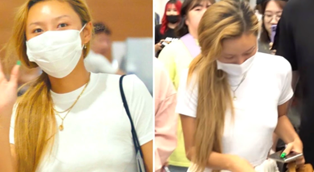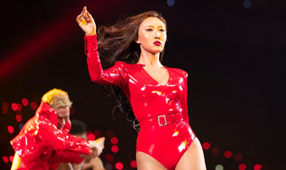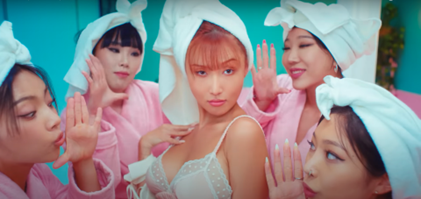As an idol, K-pop singer Hwasa is no stranger to the public eye. Since her debut in 2014, Hwasa has made her mark in the industry both as a soloist and member of the successful girl group MAMAMOO. For years, Hwasa has amassed fans all over the world, gaining supporters for her unconventional outfits, daring performances and chart-topping hits.
However, in September 2023, the idol made headlines for a different reason. Hwasa was asked to attend police questioning concerning a solo university performance that embroiled in her a public indecency controversy.
The controversial incident is attributed to her May performance of her track “Don’t Give It to Me” at Sungkyunkwan University, which went viral for “suggestive” dance moves. As a result, a civic group filed a complaint against her as they accused her of performing “obscene choreography.”
A police investigation began with Hwasa’s full cooperation. She further addressed the controversy in an interview with fellow singer Sung Si-kyung, saying that she was negatively affected by the onslaught of malicious comments. “I’m pretty sure that was the loudest cry I’ve had all year. The tears were falling like a waterfall,” Hwasa said in an episode of Sung Si-kyung’s I’ll Meet You. Later in October 2023, the police dropped the public indecency charges over Hwasa’s performance.
The increasing globalization of K-pop has put a spotlight on what makes it unique and popular. Its visual orientation is seen in the emphasis on idols’ appearances and the beauty standards that are perpetuated both in the K-pop industry and Korean society.
According to UT-Austin professor and K-pop scholar You-jeong Oh, these standards reinforce the desired images of K-pop idols, becoming a way to maximize their public appeal. For female idols, these standards include small faces, double eyelids, light skin complexions, and tall and slim figures.
Meanwhile, Hwasa, born Ahn Hye-jin, has always been known for challenging these expectations in the idol industry. Despite being the maknae of MAMAMOO, Hwasa crafted a femme fatale persona that suited her powerful vocals. Her strong idol image is complemented by her facial features, darker skin tone, and curvy figure that are viewed to “defy the beauty standards” in Korean society, and in the K-pop industry.
Standard of beauty
In a 2019 show, Hwasa shared an anecdote of an audition wherein an instructor harshly criticized her by saying: “You’re really unique and [you] sing very well, but you’re fat and not pretty.” This comment cemented a turning point in Hwasa’s life as she declared to an audience full of fans: “If I don’t fit in this generation’s standard of beauty, then I will have to become a different standard.”


Hwasa continues to make headlines for her bold outfit choices. Source: Soompi
Hwasa’s rise in popularity over the years has been accompanied by the evolution of her creative expressions that broke through the norm. For instance, her outfit during the 2018 MAMA Fans’ Choice in Japan became the target of controversy. The performance and outfit generated mixed reactions with one side claiming it was too sexy and revealing, while others praising Hwasa for her confident outfit choice.
She also received massive attention for arriving at the airport braless in 2019. Though Hwasa only did this for the purpose of comfort, the act of going braless was deemed controversial and provocative by the Korean public. In contrast, international fans commended Hwasa’s confidence in her body and fashion as well as her casualness regarding the whole issue. Others even noted that Hwasa’s part in the group’s “Hip” comeback may have parodied the airport incident.
“I Love My Body”
With her 2023 release “I Love My Body,” Hwasa challenges an industry that values conformity. The single represents the artist’s self-awareness about the beauty standards and body image issues persistent not only in the industry but also in the country.
Hwasa cited the fierce backlash and ensuing hardship from the university performance as inspiration for her song. The single was released in September 2023, months after the viral infamous performance. As with the title, the upbeat song has a very straightforward message in its relatively short length of less than three minutes. The catchy lyrics and repetitive nature of the song help with the reinforcement of the positive message it carries.
In the single, the artist sings about loving her appearance and even points out supposed imperfections that make her unique. She vocalizes her awareness of the public’s thoughts regarding her appearance, including her weight and all her physical features. She stresses that she does not let the hate comments affect her.
“It’s just that I want to be able to express the things that I’m struggling with right now, and I want to do it in a fun and loving way in my music videos, and that doesn’t mean that I don’t ignore the criticism that people send me, and I take it all in consideration,” Hwasa further explained in an interview.
The lyrics further reflect the idea that there are too many standards that society dictates. Yet, like Hwasa, listeners should not pay too much attention to what others think of them. For her, the most important thing is to live as one’s true authentic self. The music video itself has a fresh vibe, opening with a scene of Hwasa admiring her appearance in front of the mirror as she gets ready for a day out. The choreography also complements the lyrics that celebrate one’s body.
“I Love My Body” actively advocates for a positive body image and self-love in a society that values appearances most. In an interview with Forbes, Hwasa states that the song’s message is beyond loving her body but loving oneself as a whole to build up self-esteem.
“I chose this song because even though the title is primarily one-dimensional, it talks about loving my whole body, my soul, and my everything. It’s really about the self-esteem inside of my body,” Hwasa told Forbes, explaining why she chose “I Love My Body” as her first single after the controversial incident.
The song could be seen as a culmination of the years of backlash and criticism Hwasa has faced for her appearance, fashion, personality, and career as an idol.
Similar to her past works and performances, the single is Hwasa’s expression and self-affirmation of who she is and what she stands for despite the hate and criticism she has received as a female idol in the competitive K-pop industry With this, the song becomes a personal reminder for Hwasa while gaining back her self-esteem and confidence, bouncing back from the viral university performance.
The release of “I Love My Body” was received positively by fans. For them, the single’s release is a testament to the idol’s strength as she pushes back against boundaries and standards set by Korean society.
The single debuted at No. 8 on Billboard’s World Digital Song Sales Chart and topped the iTunes chart in various countries. The music video even gained over 20 million views within the first week of its release.
Reclamation
The success of “I Love My Body” is another story altogether. At a glance, contemporary Korean culture is still characterized as a patriarchal society based on traditional values. This is aggravated by the existing gender inequality issues in the country. These strict beauty standards are seen by Korean women to contribute to the unfair view and treatment against them in society. The song, although seeming simple at first, resonates with a wider audience as it shows how a woman reclaims her body and herself in front of Korean society and the rest of the world.
A growing feminist movement called “Escape the Corset” rejects these strict beauty standards that are believed to be oppressive against Korean women. The pervasiveness of such beauty standards does not only exist in Korean society but is amplified in the K-pop industry as well. The popularity of conventionally attractive idols only reinforces the idea that it is imperative to possess certain beauty standards to fit in and be accepted in Korean society.
Hwasa therefore challenges the K-pop industry that values conformity to certain beauty standards for public appeal and profit. Along with recognizing her so-called unconventional physical features, Hwasa’s music and performances reflect the idol’s self-awareness and confidence in her appearance, which adds to her appeal as a female idol, which also evolves into a source of empowerment.
Feminist expressions in her performances and statements throughout her career present a clear opposition to Korea’s patriarchal society, as evidenced in “I Love My Body.”
Though only one of the many female idols breaking boundaries and stereotypes, Hwasa proves to be a symbol of female empowerment in the K-pop industry. Beyond creating a new standard of beauty, Hwasa’s popularity paves the way for other fellow female idols to continue breaking and redefining beauty and success in the industry.

Source: P Nation
ABOUT THE AUTHOR
 Hailing from the Philippines, Maria Guada Rosita Agustin is a POSCO Asia Fellow pursuing a Masters in Global Affairs and Policy at the Yonsei GSIS. Mags, as her friends call her, has immersed herself in public diplomacy and the cultural affairs of the US, Spanish, and Philippine governments in different points of her career. Her current research interests range from issues of democracy and migration to the soft power of film. Beyond academics, Mags enjoys going through books in her continuously growing to-be-read list and finding the best egg tarts the world has to offer.
Hailing from the Philippines, Maria Guada Rosita Agustin is a POSCO Asia Fellow pursuing a Masters in Global Affairs and Policy at the Yonsei GSIS. Mags, as her friends call her, has immersed herself in public diplomacy and the cultural affairs of the US, Spanish, and Philippine governments in different points of her career. Her current research interests range from issues of democracy and migration to the soft power of film. Beyond academics, Mags enjoys going through books in her continuously growing to-be-read list and finding the best egg tarts the world has to offer.
- “I Love My Body”: Hwasa and Female Empowerment in K-Pop and Korean Society - May 6, 2025
- English Fever in South Korea - February 24, 2025
- South Korea’s Medical School Expansion – Cure Worse than the Disease? - October 20, 2024





